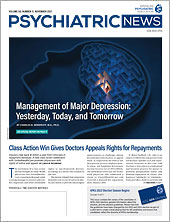The return to in-person school for most children in the United States this fall marked an exciting time for teachers and other staff, students, and families—reunited after what, for many, was more than a year of connection only over a computer screen. As COVID-19 continues to impact communities across the country, however, school staff, teachers, parents, and youth have faced numerous challenges. I believe that psychiatrists have a tremendous role to play in supporting teachers, students, and parents in our communities as they navigate mask mandates, classroom quarantines, and more this school year. One way that psychiatrists can offer this support is by testifying before school boards about the importance of measures aimed at minimizing school disruptions and maintaining a routine for children this school year.
It is well documented that children have been affected adversely by the pandemic. Social isolation from lockdowns, home schooling, and even hybrid learning has taken a toll on kids, as has the fear of being infected by COVID-19, having a relative or friend infected, and/or experiencing other family hardships related to the pandemic (such as a parent losing a job and loss of housing). Many students have repeatedly stated that they are willing to practice safety measures to reduce the spread of COVID-19 and any related school disruptions so that they might have as normal a school life as possible.
Current guidance from the Centers for Disease Control and Prevention (CDC) recommends universal masking to help mitigate the significant risk of COVID-19 transmission in schools. Additionally, mandatory masking can reduce bullying of those who wear or do not wear a mask in an optional masking scenario. The decision to mandate student and staff masking versus allowing parents the option to choose on behalf of their children has for the most part rested with local communities and school districts. The debates regarding mask mandates in schools have been extremely emotionally charged, with some arguing for optional masking based on such misinformation as COVID-19 not being as severe as the experts have reported, COVID-19 not being harmful to kids, and COVID-19 being a politically driven disease; others have argued masks should be optional in schools because they believe that wearing a mask is emotionally damaging to children and view mask mandates as an infringement of personal liberty.
Rather than focusing on differing views on strategies to prevent the spread of COVID-19 in the schools, psychiatrists can help teachers and parents to recognize where they are unified: ensuring children have as normal an academic year as possible during a pandemic. Psychiatrists, for example, can assist school boards in crafting risk communication messages about COVID-19 and advocate for good public health measures, including supporting efforts by school boards to develop COVID-19 medical advisory committees to provide guidance on COVID-19 mitigation measures.
Instead of focusing on the limitations of masks and other measures to prevent the spread of COVID-19 in schools, psychiatrists can work with parents and teachers on ways they might foster awareness in students about how such measures empower students to be part of the solution to reducing the spread of COVID-19 and promote their mental health by keeping them in school.
Despite efforts to mitigate the spread of COVID-19 in schools, there have been and will continue to be positive cases in the classroom. The way in which school districts support their teachers and students who are suddenly quarantined due to possible exposure and must return to virtual learning environments will be key to mitigating the adverse effects of a disrupted school year. Psychiatrists can help to educate schools on the importance of parents and teachers of quarantined students working collaboratively to ensure the children’s learning and routine be as minimally disrupted as possible. This can include trying to maintain the same schedule as if the child is going to school; having the child wear school clothes to virtual school; and substituting missing routines with other learning activities, including reading and creative learning through pre-identified educational programs. Using social media to connect with other parents in similar situations, sharing learning tools, and providing support can also be helpful.
COVID-19 remains a significant threat, and schools have become one of the front lines in the public health response to the virus. Many school districts, school staff, teachers, and parents have done an excellent job at protecting our students. Maintaining school activities is important for all children, especially those with special needs, as it provides structure and support. We must continue to promote ways to further those efforts to ensure our children are safe and learning disruptions are minimized. By masking and other measures, communities and students can choose not to live in fear but with determination to fight the spread of COVID-19 and end this pandemic. ■

